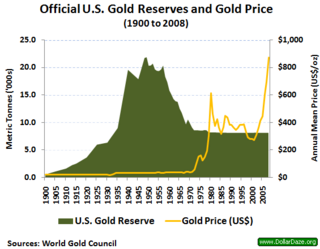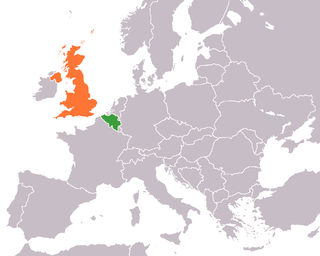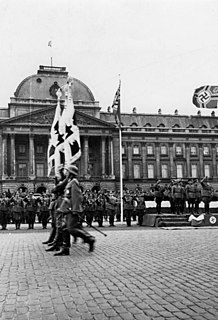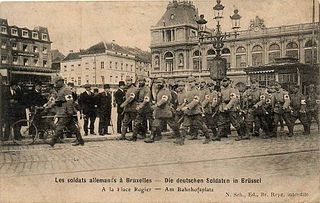German invasion of Belgium may refer to:
- German invasion of Belgium (1914) during World War I
- German invasion of Belgium (1940) during World War II
German invasion of Belgium may refer to:

Albert I reigned as King of the Belgians from 1909 to 1934. He ruled during an eventful period in the history of Belgium, which included the period of World War I (1914–1918), when 90 percent of Belgium was overrun, occupied, and ruled by the German Empire. Other crucial issues included the adoption of the Treaty of Versailles in June 1919, the ruling of the Belgian Congo as an overseas possession of the Kingdom of Belgium along with the League of Nations mandate of Ruanda-Urundi, the reconstruction of Belgium following the war, and the first five years of the Great Depression (1929–1934). King Albert died in a mountaineering accident in eastern Belgium in 1934, at the age of 58, and he was succeeded by his son Leopold III. He is popularly referred to as the "Knight King" or "Soldier King" in Belgium in reference to his role during World War I.

The Battle of France, also known as the Fall of France, was the German invasion of France, Belgium, Luxembourg and the Netherlands during the Second World War. On 3 September 1939, France had declared war on Germany, following the German invasion of Poland. In early September 1939, France began the limited Saar Offensive. By mid-October, the French had withdrawn to their start lines. The Germans invaded Belgium, Luxembourg and the Netherlands on 10 May, Italy entered the war on 10 June 1940 and German forces defeated the Allies on 25 June. France and the Low Countries were conquered, ending land operations on the Western Front until the Normandy landings on 6 June 1944.

The Western Front was a military theatre of World War II encompassing Denmark, Norway, Luxembourg, Belgium, the Netherlands, the United Kingdom, France, Italy, and Germany. World War II military engagements in Southern Europe and elsewhere are generally considered as separate theatres. The Western Front was marked by two phases of large-scale combat operations. The first phase saw the capitulation of Luxembourg, Netherlands, Belgium, and France during May and June 1940 after their defeat in the Low Countries and the northern half of France, and continued into an air war between Germany and Britain that climaxed with the Battle of Britain. The second phase consisted of large-scale ground combat, which began in June 1944 with the Allied landings in Normandy and continued until the defeat of Germany in May 1945.

A gold reserve is the gold held by a national central bank, intended mainly as a guarantee to redeem promises to pay depositors, note holders, or trading peers, during the eras of the gold standard, and also as a store of value, or to support the value of the national currency.

The Allies of World War II were a group of countries that together opposed the Axis powers during the Second World War (1939–1945). The Allies promoted the alliance as a means to defeat Nazi Germany, the Empire of Japan, Fascist Italy and their allies.

The Allies of World War I or Entente Powers were a coalition of countries led by France, Britain, Russia, Italy, Japan and the United States against the Central Powers of Germany, Austria-Hungary, the Ottoman Empire, Bulgaria and their colonies during the First World War (1914–1918).

The Rape of Belgium was the mistreatment of Belgian civilians by German troops during the invasion and occupation of Belgium in World War I.

The Belgian Resistance collectively refers to the resistance movements opposed to the German occupation of Belgium during World War II. Within Belgium, resistance was fragmented between many separate organizations, divided by region and political stances. The resistance included both men and women from both Walloon and Flemish parts of the country. Aside from sabotage of military infrastructure in the country and assassinations of collaborators, these groups also published large numbers of underground newspapers, gathered intelligence and maintained various escape networks that helped Allied airmen trapped behind enemy lines escape from German-occupied Europe.

The Allied leaders of World War II listed below comprise the important political and military figures who fought for or supported the Allies during World War II. Engaged in total war, they had to adapt to new types of modern warfare, on the military, psychological and economic fronts.

Belgium–United Kingdom relations are foreign relations between Belgium and the United Kingdom. Belgium has an embassy in London and 8 honorary consulates. The United Kingdom has an embassy in Brussels.
The following outline is provided as an overview of and topical guide to World War II:
This is a timeline of events that stretched over the period of World War II.

The invasion of Belgium or Belgian campaign, often referred to within Belgium as the 18 Days' Campaign, formed part of the greater Battle of France, an offensive campaign by Germany during the Second World War. It took place over 18 days in May 1940 and ended with the German occupation of Belgium following the surrender of the Belgian Army.

Despite being neutral at the start of World War II, Belgium and its colonial possessions found themselves at war after the country was invaded by German forces on 10 May 1940. After 18 days of fighting in which Belgian forces were pushed back into a small pocket in the north-west of the country, the Belgian military surrendered to the Germans, beginning an occupation that would endure until 1944. The surrender of 28 May was ordered by King Leopold III without the consultation of his government and sparked a political crisis after the war. Despite the capitulation, many Belgians managed to escape to the United Kingdom where they formed a government and army-in-exile on the Allied side.

The history of Belgium in World War I traces Belgium's role between the German invasion in 1914, through the continued military resistance and occupation of the territory by German forces to the armistice in 1918, as well as the role it played in the international war effort through its African colony and small force on the Eastern Front.

The Garde Civique or Burgerwacht was a Belgian paramilitary militia which existed between 1830 and 1920. Created in October 1830 shortly after the Belgian Revolution, the Guard amalgamated the various militia groups which had been created by the middle classes to protect property during the political uncertainty. Its role was as a quasi-military "gendarmerie", with the primary role of maintaining social order within Belgium. Increasingly anachronistic, it was demobilised in 1914 and officially disbanded in 1920, following a disappointing performance during the German invasion of Belgium in World War I.

The involvement of the Grand Duchy of Luxembourg in World War II began with its invasion by German forces on 10 May 1940 and lasted beyond its liberation by Allied forces in late 1944 and early 1945.

During the Second World War, Pope Pius XII maintained links to the German resistance to Nazism against Adolf Hitler's Nazi regime. Although remaining publicly neutral, Pius advised the British in 1940 of the readiness of certain German generals to overthrow Hitler if they could be assured of an honourable peace, offered assistance to the German resistance in the event of a coup and warned the Allies of the planned German invasion of the Low Countries in 1940. The Nazis considered that the Pope had engaged in acts equivalent to espionage.
France was the largest military power to come under occupation as part of the Western Front in World War II. The Western Front was a military theatre of World War II encompassing Denmark, Norway, Luxembourg, Belgium, the Netherlands, the United Kingdom, France, Italy, and Germany. The Western Front was marked by two phases of large-scale combat operations.

The German occupation of Belgium of World War I was a military occupation of Belgium by the forces of the German Empire between 1914 and 1918. Beginning in August 1914 with the invasion of neutral Belgium, the country was almost completely overrun by German troops before the winter of the same year as the Allied forces withdrew westwards. The Belgian government went into exile, while King Albert I and the Belgian Army continued to fight on a section of the Western Front. Under the German military, Belgium was divided into three separate administrative zones. The majority of the country fell within the General Government, a formal occupation administration ruled by a German general, while the others, closer to the front line, came under more repressive direct military rule.